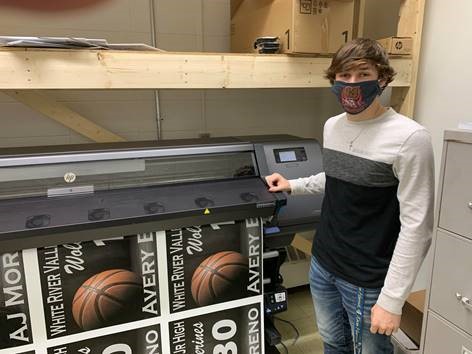Southern Indiana high school’s enterprise gives kids business experience
High schools tend to use two simple metrics to determine the success of their graduating classes: how many students go to college, and how many find jobs.
A few years ago, White River Valley School District Superintendent Bob Hacker realized that those metrics weren’t driving the kind of success his kids needed. He wanted a fresh approach.
The result is Wolverine Enterprises LLC, a cluster of commercial businesses led and operated by students at White River Valley High School (WRVHS) in Greene County’s Switz City.
Hacker’s push for a new approach was driven in part by a survey that revealed that, while more than two-thirds of Greene County high school graduates went off to college, only 28% of them returned for their second year. The rest? Many of them returned to Greene County with few prospects for the future.
Hacker saw the opportunity to address this by building on WRVHS’ strong Career and Technical Education (CTE) program to allow kids to gain not just tangible skills but also workplace experience, soft skills, college credits and, in some cases, a paycheck. “Our teachers have done a great job adapting their CTE offerings to the real world of skills application in a business setting,” Hacker said.
Wolverine Enterprises operates six businesses: precision machining, agriculture and ag power, advanced manufacturing and construction, print services, frozen foods manufacturing, logistics and arts (jewelry and pottery design). Using tools, facilities and equipment at the school, the Wolverine Enterprises students pursue business opportunities, take orders, design and produce goods and services, ship items to customers and manage the financial side of the businesses, operating under a c-suite also made up of students.
The roughly 90 kids who participate in Wolverine Enterprises (out of a total WRVHS enrollment of about 250) tend to choose to join businesses aligned with the classes they’re taking, but not always, said Katelyn Thomas, the WRVHS teacher who serves as Wolverine Enterprises program director. “Even the kids who don’t have a true vision of where they want to go … have found something in their business,” she said. “They’ve learned something new, found something they’re good at and gained a new skill.”

Making many of these experiences possible are partners and supporters who have come alongside Wolverine Enterprises. The LLC is a part of the Conexus work-based learning program, and Conexus also has provided grants and other resources. A Lilly Endowment Regional Opportunity Initiative grant was instrumental in launching the program, and support from the Greene County Community Foundation has provided a boost as well. Overall, Hacker said, the program has attracted more than $2 million in financial support.
At the same time, Wolverine Enterprises benefits from community support, with area businesses purchasing products and services from the kids, creating internships for Wolverine Enterprises participants, mentoring participants and serving on the Wolverine Executive Board, which includes school administrators and teachers as well as local business owners. Meanwhile, they appreciate the opportunity to improve the quality of the employee pipeline.
The benefits for students participating in Wolverine Enterprises are multifaceted: hands-on training, business experience, technical-skills acquisition, operational knowledge of systems and processes used in the real world, college credits, certifications required in some industries, a paycheck, and more.
While many CTE programs focus on kids who aren’t bound for college, Wolverine Enterprises includes students who are going on to post-secondary educations. “Our CEO from last year was a direct admit to IU’s Kelley School of Business,” he pointed out. “And our CFO was a direct admit to business school at the University of Arkansas.”
With all of the benefits Wolverine Enterprises provides to students, Hacker thinks the greatest benefit might be that the program helps to prepare students for more than just the next step.
“I don’t want them to graduate with just a job,” said Hacker. “I want them to graduate with something they love to do and that they can experience here for real.”
